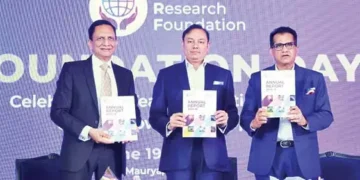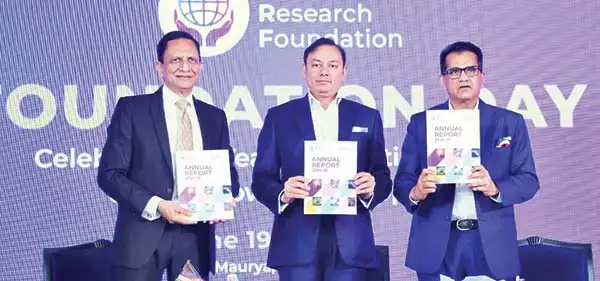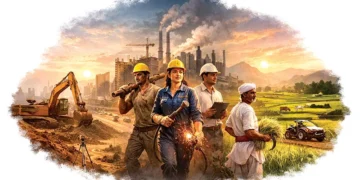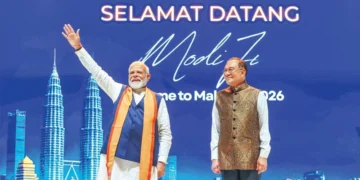Sandeepp Saxena
CHINTAN Research Foundation (CRF), an independent thinktank supported by Adani Group, celebrated its first Foundation Day in New Delhi on June 19. The event witnessed an overwhelming presence of Ambassadors, bureaucrats, journalists, fellow think-tanks, industry leaders, and other key stakeholders to share the idea of the multi-faceted role that think tanks play in India.
Speaking at the event, Pranav Adani, Director of Adani Enterprises, talked about the major role that that think-tanks play in the development aspirations of India’s journey and how CRF contributes to this with the mantra of ‘growth with goodness’.
He said, “Policy is not abstract. It is personal; and the growth must be measured not just in numbers, but in the lives that we touch, the lives we help improve. And this is CRF’s mission – to drive change and contribute to India’s rise in a way that uplifts every section of society and helps shape a Viksit Bharat.”
Research work lauded
Amitabh Kant, former G20 Sherpa of India and CEO, NITI Aayog, echoed that CRF will be part of this transformation and appreciated the research work that the Foundation has done, and continues to do. He emphasised the need for thinktanks to provide constructive feedback to the Government. “India-based thinktanks must aim to build an ecosystem of intellectual collaboration, where systemic thinking, evidence-based policy, creative problem-solving, and constructive criticism becomes the norm across sectors,” said Kant.
Shishir Priyadarshi, President of the CR, said only by continually asking where we stand and where we must act, India can effectively chart the future. This reflective inquiry has become a mission for the CRF, he stressed.
Think-tanks, he said, “must be more than silent observers and should create a space for a better, more inclusive, and more sustainable world where every voice resonates and drives action to lead a meaningful change for people-centric development.” For this, he emphasised that think-tanks must ask tough questions – to policymakers, to the Government, and to the civil society.
Looking beyond Delhi
This people-centric development must extend beyond Delhi as India is not one city, or one region – the different regions have different demands and voices, which must be heard and addressed, highlighted Pranav Adani during his address. By anchoring the Global South narrative, think-tanks like the CRF, are proactively contributing to the global discourse from the perspective of the South.
Here, he said, India is shifting the narrative by building impactful policy narratives with evidence-based research. By prioritising this narrative, CRF can play a crucial role in ensuring that the Global South is both seen and heard on the global stage, driving change that is equitable, inclusive, and sustainable.
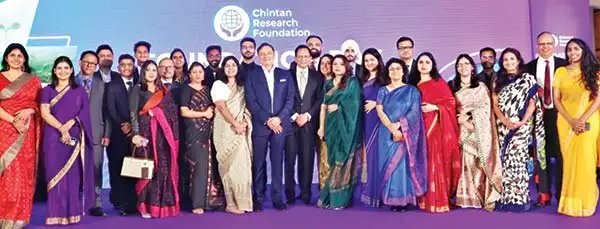
The uniqueness of CRF also lies in its approach as it integrates policy insights with industry realities, while fostering connections between the Government, industry, and citizens.
Shaping the future
Additionally, speakers at the event highlighted the significance of think-tanks in reimagining India’s role in shaping the future, particularly in relation to the Global South. For this, they said, it is crucial for India to understand the reality, and focus on key areas – climate change, equitable energy transition, global economy, critical supply chains, trade, and the overarching geopolitics, through evidencebased research. Speakers and participants acknowledged that think-tanks across the country need to collaborate and prioritise objectivity, sustainability, and people-centric, data-driven solutions to address pressing policy challenges.
CRF has been doing extensive research on critical issues through its three centres that focus on climate change and transition; economy and trade; and geopolitics and strategic studies. Through these centres, the CRF’s vision to reflect, to lead to action, to spark a meaningful change, and finally advance the change to bring people-centric development encapsulates the very purpose of the think-tank. This emerging think-tank prioritises objectivity, sustainability, and people-centric, data-driven solutions to address pressing policy challenges.
